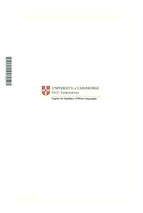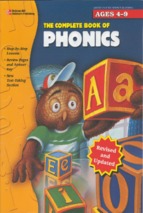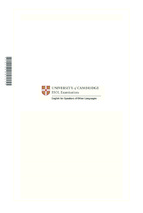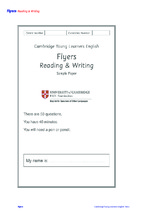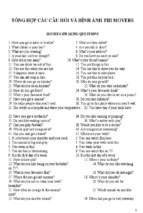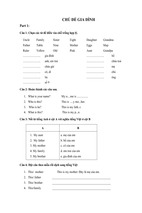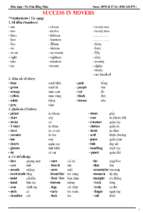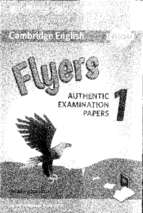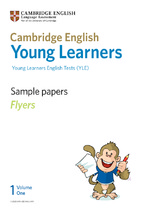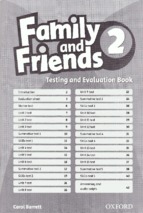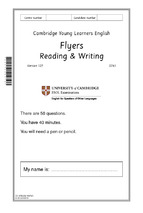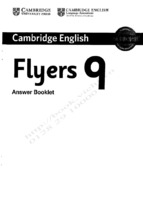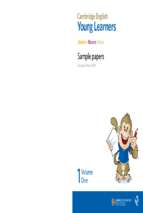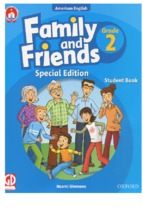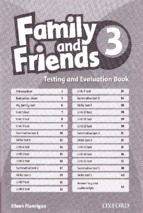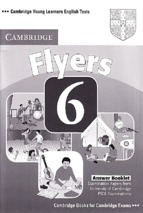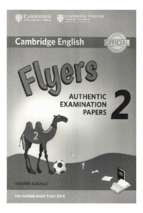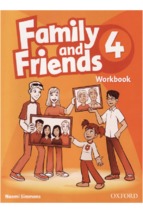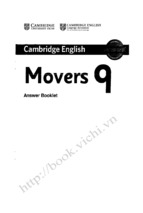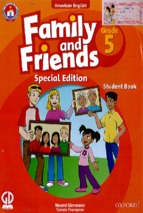E
I
Challenging and Enjoyable Lessons in English Usage
by R.E. Myers
illustrated by Bron Smith
Teaching & Learning Company
This book belongs to
____________________________________________________________
This book is dedicated to David Kwiat
with sincere appreciation and admiration.
Cover design by Sara King
Illustration on page 56 by Ernie Hager. Used with
permission.
Copyright © 2005, Teaching & Learning Company
ISBN No. 1-57310-450-7
978-1-4291-1285-7
Printing No. 987654321
Teaching && Learning
Teaching
LearningCompany
Company
1204
Buchanan
St., P.O. Box 10
Dayton,
OH 45401-0802
Carthage,
IL 62321-0010
www.LorenzEducationalPress.com
The purchase of this book entitles teachers to make
copies for use in their individual classrooms only.
This book, or any part of it, may not be reproduced
in any form for any other purposes without prior
written permission from the Teaching & Learning
Company. It is strictly prohibited to reproduce any
part of this book for an entire school or school district, or for commercial resale.
All rights reserved. Printed in the United States of
America.
ii
TLC10450 Copyright © Teaching & Learning Company, Carthage, IL 62321-0010
Table of Contents
Progressions
Sequencing .
......................6
Sequencing .
A Trip to Remember
Moths Fly at Night �Mostly�
...............8
Sequencing .
Following Directions.
Unscramble the Letters
Following Directions.
. . . . . . . . . . . . . 15
Alliteration, Syllabication .
. . . . . 16
. . . . . . . . . . . . . . . . . . 17
. . . . . . . . . . . . . . . . . . . . . . . 18
Bankers Aren t So Dumb
Similes .
. . . . . . . . . . . . . 20
It s a Pleasedness to Do Business
Nouns Name
Fitting Partners
Dynamic Verbs
. . . . . . . . . . . . . . . . . . . . . . . . 23
Proper Nouns
Verbs
. . . . . . . . . . . . . . . . . 25
. . . . . . . . . . . . . . . . . . . . . . . 27
Motoring with Nervous Nellie
Phrases with Prepositions
Sentences
Verbs: Gerunds
. . 29
Prepositional Phrases, Nouns,
. . . . . . . . . . . . . . . . . . . . . . . . . . . . . . . . . 30
Agreeable and Disagreeable Verbs
The Word Game
Ice and Fog
Rhyme, Synonyms .
Spelling .
A Lot of Alliteration
Agreement
. . . 32
. . . . . . . . . . . . . 34
. . . . . . . . . . . . . . . . . . . . . . . . 36
Mindy s Annual Checkup
Spelling
Alliteration .
More Sentence Sense
Impressions
Categories
. . . . . . . . . . . . . . . . . . . . 52
Sentences .
Vocabulary Building.
. . . . . . . . . . . . . . 54
. . . . . . . . . . . . . . . . 56
. . . . . . . . . . . . . . . . . . . . . . . . 58
Categories
Vocabulary Building, Abstracting
. . . . 59
Vocabulary Building, Word Usage .
. . . . 60
I m Thinking . . .
Magic Squares
. . . . . . . . . . . . . 50
What Do They Have in Common?
. . . . . . . . . . . . . . . . . . . . . . . . . 21
Nouns
. . . . . . . . . . . . . . . . . . . . . 48
Sentences
Homonyms .
Suffixes
Spoonerisms
Sentence Sense
Punctuation, Vocabulary Building
with You
Tons of Soil
. . . . . . . . . . . . . . . . . 46
. . . . . . . . . . . . . . . . . . . . . 14
Paddy
Antonyms .
Riddles, Puns .
Natural Riddles
. . . . . . . . . . . . . . 44
Predicates, Subjects
Capitals, Punctuation
In Contrast
Word Play .
Occupational Names
Shuffled Syntax
Susan
Maria s Problem
. . . . . . 11
. . . . . . . . . . . . . . . . . . . . . . 43
Palindromes
. . . . 13
Unscramble More Letters
Sounds and Syllables
. . . . . . . 10
Either Way
. . . . . . . . . . . . . 38
. . . . . . . . . . . . . . 40
TLC10450 Copyright © Teaching & Learning Company, Carthage, IL 62321-0010
Brieflies
Adverbs, Puns .
Abstracting .
. . . . . . . . . . . . . . . . . . . . . . . 62
Buzz, Swish and Slurp
Onomatopoeia .
Statements to Ponder
Ambiguity .
Ready by Five
Proofreading
Tito s License Game
. . 61
. . . . . . . . . . 64
. . . . . . . . . . . . . 66
. . . . . . . . . . . . . . . . . . . 68
Subjects, Predicates, Paragraphs .
. 70
Practice Makes Perfect Proofreading, Self-Evaluation. . 73
Mixed-Up Maxims
Maxims, Subjects, Predicates
. . . . . 74
. . . . . . . . . . . . . . . 76
The Sow s Plow
Quatrain, Rhyme
Time Lines
. . . . . . . . . . . . . . . . . . . . . . . . . . . 79
Titles
The Game of Naming
Naming
. . . . . . . . . . . . . . . . 82
Answer Key. . . . . . . . . . . . . . . . . . . . . . . . . . . . . . . 84
iii
Dear Teacher or Parent,
This book is a collection of activities that combine the elements of grammar, syntax and
sentence structure instruction in a palatable way, by adding humor and whimsy. Students
are encouraged to use their own ideas and language as they learn through old-fashioned
language instruction and creative thinking.
E. Paul Torrance has offered some excellent advice to teachers who want to motivate their
students to learn. In effect, he tells them to set the stage in order to get them ready to
think and to act. To prepare your students for a meaningful learning experience, Torrance
advises you “heighten anticipation.” This state of the pedagogical process has also been
called the “warm-up.” The following expressions he uses to describe this process are highly
suggestive:
Create the desire to know.
Heighten anticipation and expectation.
Get attention.
Arouse curiosity.
Tickle the imagination.
Give purpose and motivation.
As he points out, you need to have your students’ attention. Without that, the “warming
up” will be ineffectual. Capture the attention of your students. You are probably an expert
in several ways. (We don’t advise you to go at it in a high-handed fashion, however. The
mood for any of these units would therefore be destroyed.)
After you have their attention, heighten anticipation with some introductory remarks.
Tease students with an item from one of the activities. For example, you might allude to
the way headline writers regularly use puns in the sports pages. Ask students to react to
a headline such as “Oilers’ defense too slick for Jets in clutch” (as in the “Twisters” activity). Or read a pun in a newspaper. Leading into a unit this way will get your students in the
mood for it.
To arouse their curiosity and get them in the mood to think whimsically, present a verbal
statement such as: “The girl was heaply dirt by the insult.” Ask them what the statement
means. This is the kind of “spoonerism” they will deal with in “Tons of Soil” (page 48). Your
students may do a mental double-take at such mixed up language, but it will “tickle the
imagination.”
You will probably have your own ideas about how to introduce the lessons after looking
them over. You’ll want to modify and improve the lessons to make sure they suit your
students.
Sincerely,
R.E. Myers
iv
TLC10450 Copyright © Teaching & Learning Company, Carthage, IL 62321-0010
Introduction
Victor Borge proved that punctuation can be funny when
made audible. This book is an attempt to consider grammar,
capitals and sentence fragments in a similarly humorous way.
Teaching basic language skills in a way that involves your
students thinking abilities as well as their funny bones will
help them remember important facts.
The intent of these activities is to cause students to ponder,
evaluate, imagine, reconsider and inquire. Critical and creative thinking skills as well as the application of rules are also
required.
Since an author of educational materials has no way of
knowing exactly who the targets of his or her ideas will be,
the teacher should alter, delete or supplement any of the
ideas in this book in order to fit the needs of the students in
the class.
TLC10450 Copyright © Teaching & Learning Company, Carthage, IL 62321-0010
5
Name_____________________________________
Activity 1
s
n
o
i
s
s
e
r
g
o
r
P
Sequencing
If you were asked to put these words in a logical order
woman
baby
girl,
you would probably quickly arrange them this way:
baby
girl
woman.
That would be putting the words in a kind of chronological order with the youngest first and
the oldest last. There are other ways to order things logically. For example, animals can be
ordered by size, speed, intelligence and by many other ways.
Arrange each set of three words in a logical order.
1. lunch, breakfast, dinner
________________________
________________________
________________________
2. dollar, penny, quarter
________________________
________________________
________________________
3. strolling, dancing, racing
________________________
________________________
________________________
4. tortoise, porpoise, sparrow
________________________
________________________
________________________
6
TLC10450 Copyright © Teaching & Learning Company, Carthage, IL 62321-0010
Name_____________________________________
5. breeze, tornado, gale
__________________________
__________________________
__________________________
6. copying, scribbling, composing
__________________________
__________________________
__________________________
7. yelling, whispering, speaking
__________________________
__________________________
__________________________
8. daydreaming, inventing, sleeping
__________________________
__________________________
__________________________
9. quatrain, couplet, triplet
__________________________
__________________________
__________________________
10. letter, e-mail message, telegram
__________________________
__________________________
__________________________
11. paragraph, sentence, story
__________________________
__________________________
__________________________
12. stranger, acquaintance, friend
__________________________
__________________________
__________________________
TLC10450 Copyright © Teaching & Learning Company, Carthage, IL 62321-0010
7
Name_____________________________________
Activity 2
r
e
b
m
e
m
e
R
o
t
A Trip
Sequencing
The teacher asked the class to write a What I Did During Summer Vacation composition.
Tawnee Barkas wrote the following narrative:
Our Trip to Chicago
We left our home in the Marina District of
San Francisco on Monday. Our family Dad
�36�, Mom �32�, me �11�, Lisa �7� and Brad
�5� had gotten up at 5:30 because Mom
wanted to get an early start on our trip to
Chicago. That was the first mistake, but
there were lots more. Maybe I should say
that going to Chicago was our first mistake.
Somehow �I don t really know why� Dad
forgot to fill up the gas tank of our old Ford
station wagon, and we ran out of gas just
two miles after we d passed the San
Francisco-Oakland Bay Bridge toll plaza on
the Oakland side. He had to walk nine
blocks and then wait 20 minutes until a
service station opened up. It was 7:30 when
we ran out of gas. �Remember we got up
real early!� As luck would have it, after Dad
got the gas and began walking back to the
car, it started to rain hard. That made him
almost as mad as when we were in a motel
in Omaha and the handle came off the hot
water faucet in the shower and he scalded
his hand. That experience must have made
him decide we could make it all the way to
Chicago the next day. We should have been
prepared for motel problems because the
night before, in Cheyenne, the desk clerk
said they didn t have any reservation for
our family. There was a convention in
8
town, and there wasn t a room to be had in
any motel or hotel. We slept in the car.
Uncomfortably, I might add.
It was lucky we had a good motel room in
Reno after running out of gas in Oakland
because I think Mom would have made Dad
turn around and go home if it had been a
bad one. She didn t want to go to see the
Chicago Cubs play anyway. We had some
excitement in Wyoming. Before we got to
Laramie, Brad spotted some wild burros in a
field near the road. He talked Dad into letting him out of the car to see them better,
TLC10450 Copyright © Teaching & Learning Company, Carthage, IL 62321-0010
Name_____________________________________
and was a cheap watch you could get at
Wal-Mart for $9.99 anyway. Dad insisted
that they take it since we had wasted a lot
of time trying to do the right thing.
When we finally got into Chicago on Friday
and located Wrigley Field, Dad found out
that the Cubs were in Boston on a five-day
road trip. When he told Mom, she turned
purple. Dad was a nice shade of red. I don t
want to write about the trip back. It was
much worse.
Questions
1. Make a list of the places Tawnee said
her family stopped on their trip. Put
them in the order in which they
occurred. After you have completed
your list, check a map to see if you have
the places in the correct order.
but when one of the burros came right up
to him he dropped his peanut butter and
jelly sandwich and ran back to the car,
yelling like crazy. I guess the burro was
interested in his sandwich. Both of the little
kids were problems that day. A few hours
before, we had to stop for gas at Rock
Springs and Lisa left her little purse with
two dimes and a comb in it in the restroom.
Dad refused to go back for it when Lisa discovered she had left it at the service station. She didn t stop crying until Brad spotted the burros.
2. Though Tawnee wrote mostly about the
members of her family, you can get an
idea of what she is like from reading her
account of the trip. How would you
describe her personality? Draw a picture of Tawnee on the trip, or tell how
you think she might have looked.
Getting out of the car on the highway did
not seem to work out for us, I guess. Before
we got to Salt Lake City and a place to sleep
as good as the motel in Reno �we hoped�,
Dad thought it would be nice to have a picnic by the side of the road. By chance, Brad
found a wristwatch with a broken band in
the dirt. Mom insisted we take it to the
police at the nearest town, which took us 12
miles out of the way. The police there
checked it out and said it wasn t working
TLC10450 Copyright © Teaching & Learning Company, Carthage, IL 62321-0010
9
Name_____________________________________
Activity 3
)
y
l
t
s
o
M
(
t
h
g
i
N
t
a
y
l
F
s
Moth
Sequencing
Put the sentences below in a logical order. Write the numbers 1-14 next to the sentences in
pencil to indicate their order. You can erase numbers if you change your mind about where
they go. Write out these comments about moths and butterflies, in the order in which you
think the author meant them to be, on another sheet of paper:
____ Or a butterfly.
____ Why is a jackrabbit a hare?
____ If so, the one with the wings flat when it is resting is the moth, and the one with the
wings folded is the butterfly.
____ I confess that I can t tell a moth from a butterfly.
____ When does a butterfly stop flying around?
____ Oh well, it probably doesn t make any difference, except to another moth.
____ Have you ever seen moths and butterflies flying around at the same time?
____ Have you ever seen them compete for space on the same plant?
____ At five minutes before sundown when the weather is good?
____ �In fact, a hare and a rabbit look the same to me, too.
____ At an hour before the time given in the newspaper for the sun s setting?
____ Nevertheless, the reference books state that moths fly at night mostly and butterflies don t.
____ But you have to see them at rest.
____ Why isn t it a rabbit, for goodness sakes!�
Have you ever seen moths and butterflies flying around at the same time?________________
__________________________________________________________________________________
10
TLC10450 Copyright © Teaching & Learning Company, Carthage, IL 62321-0010
Name_____________________________________
Activity 4
s
r
e
t
t
e
L
e
h
t
e
l
b
m
a
r
c
s
n
U
g Directions
Followin
Follow the clues below to fill in the blank lines. Then guess the two unknown words.
1. Starting on the first two blank lines, print the abbreviation for the word knock out.
2. On the next four lines, print the color of a clear sky.
3. Change the fourth letter to the letter between n and p.
4. Change the next-to-the-last letter to the 19th letter of the alphabet.
5. Cross out the last letter; you won t need it.
6. Unscramble the letters to see what they spell.
Hint: You find them in libraries and schools.
____ ____ ____ ____ ____ ____
1. Starting on the first two blank lines, print the abbreviation for the state south of North
Dakota.
2. Print the word for the opposite of far on the next four lines.
3. Put the sixth letter of the alphabet on the last line.
4. Change the fifth letter to I.
5. Unscramble the letters and you should have what everyone needs.
____ ____ ____ ____ ____ ____ ____
TLC10450 Copyright © Teaching & Learning Company, Carthage, IL 62321-0010
11
Name_____________________________________
Make up your own game like the two on page 11. Give five or six directions for filling in the
lines. When someone has followed your directions correctly, the letters above the lines should
spell a familiar word.
1.
______________________________________________________________________________
2.
______________________________________________________________________________
3.
______________________________________________________________________________
4.
______________________________________________________________________________
5.
______________________________________________________________________________
6.
______________________________________________________________________________
______________________________________________________________________________
Follow the clues below to fill in the blank lines. Then guess the two unknown words.
1. Starting on the first four blank lines, print the thing children love to do.
2. On the next line, print the seventh letter of the alphabet.
3. On the last line, print the first letter in the direction opposite of north.
4. Change the fourth letter to the letter between d and f.
5. Change the next-to-the-last letter to the same as the fourth letter.
6. Unscramble the letters to see what they spell.
Hint: One of the magic words taught to children.
____ ____ ____ ____ ____ ____
12
TLC10450 Copyright © Teaching & Learning Company, Carthage, IL 62321-0010
Name_____________________________________
Activity 5
s
r
e
t
t
e
L
e
r
o
M
e
l
b
m
a
r
c
s
Un
ns
owing Directio
Foll
1. On the first two lines, print the abbreviation for the room in a hospital where badly
injured people go.
2. On the next three lines, print the word rude fans yell when they don t like the referee s
call.
3. On the last two lines, print the abbreviation for Old English.
4. Change the third and fourth letters to the abbreviation of South America.
5. Change the next-to-the-last letter to the 18th letter in the alphabet.
6. Cross out the fifth letter; you won t need it.
7. Reverse the first two letters.
8. Unscramble the remaining six letters to see what they say.
Hint: What every pencil needs.
____ ____ ____ ____ ____ ____ ____
People are always giving or asking for directions. Unfortunately, some people are not clear
when they give directions and the person trying to follow them gets mixed up or lost. This
often happens when directions are given for finding a specific location. What are some of the
mistakes people make in giving directions to a town, street address or a place of business?
__________________________________________________________________________________
__________________________________________________________________________________
__________________________________________________________________________________
__________________________________________________________________________________
__________________________________________________________________________________
__________________________________________________________________________________
TLC10450 Copyright © Teaching & Learning Company, Carthage, IL 62321-0010
13
Name_____________________________________
Activity 6
Susan
Capitals, Punctuation
The following paragraph is not punctuated.
There are no capitals, commas or periods.
Write capital letters over those that need
to be capitalized and place commas and
periods where they are needed.
susan has good handwriting she always
wears nice clothes in the latest style and
her hair is neat susan even gets all her
math right she has a twinkie for lunch
sometimes but she usually eats only
food that is good for you susan had the
leading part in our play last month
everyone hates susan.
Why do you suppose
Susan?
14
everyone hates
TLC10450 Copyright © Teaching & Learning Company, Carthage, IL 62321-0010
Name_____________________________________
Activity 7
Paddy
ilding
u
B
y
r
a
l
u
b
a
c
o
V
Punctuation ,
Add punctuation marks and capitals to make this story readable. Indent wherever a new paragraph is needed.
paddy was my pig or maybe he was my hog at any rate he had a curly tail and a blunt
snout and so we can assume he was a porker after he was weaned paddy became very
fond of me it must have been because I was the only one in the family who would feed
him he wanted to go everywhere with me he followed me into the house whenever he
could even following me into my bedroom and the bathroom I drew the line there you
wait there paddy id tell him a girl needs some privacy the most trouble I ever had with
paddy was when he got loose one day and dug up old mrs olivers garden what an awful
sight when she came home mrs oliver was as churned up as her garden I will admit there
were more furrows and bumps in the garden but not too many more we survived that but
mrs oliver was red in the face for a week and she would not speak to me for twenty two
days that was all right with me because she had a voice like a sick crow and a laugh that
frightened all her livestock they never did get used to her laugh paddy seemed to like it
though he was actually fond of mrs oliver too bad that feeling wasnt reciprocated
Circle the word that best describes the two characters in the story.
Paddy was �a� affable
�b� perky
Mrs. Oliver was �a� imperious
�c� amiable
�b� irascible
TLC10450 Copyright © Teaching & Learning Company, Carthage, IL 62321-0010
�d� debonair
�c� irritating
�d� tempestuous
15
Name_____________________________________
Activity 8
s
e
l
b
a
l
l
y
S
d
n
Sounds a
ation
c
i
b
a
l
l
y
S
,
n
o
i
t
Allitera
Think of two words equivalent to each two-word definition below. The two words must have
the same initial sound �as in Big Ben and lovely Louisa �. They must also have the same
number of syllables as the definition. �For example, if unclean canine is the definition, dirty
doggy could be an equivalent pair of words with the same number of syllables. Dirty dog
would not work because dog has only one syllable and canine has two.�
1. smart lad ____________________________________________________________________
2. honest bum __________________________________________________________________
3. cool wind ____________________________________________________________________
4. mighty thrower ______________________________________________________________
5. hirsute people ________________________________________________________________
6. gloomy male
________________________________________________________________
7. good food ____________________________________________________________________
8. weary boxer __________________________________________________________________
9. insane throng ________________________________________________________________
10. stumpy body
________________________________________________________________
11. soaked ladies
________________________________________________________________
12. lovely bouquet ________________________________________________________________
13. lively Franklin ________________________________________________________________
16
TLC10450 Copyright © Teaching & Learning Company, Carthage, IL 62321-0010
Name_____________________________________
Activity 9
m
e
l
b
o
r
P
s
’
a
i
r
a
M
Homony ms
Homonyms are words that sound alike but
are not usually spelled the same, and have
different meanings. In the following story
choose the correct words from the 14 sets
of homonyms. Cross out the incorrect
words in parentheses.
Maria was �knew, new� at her job and,
more importantly, �new, knew� in town.
She didn t know her way around and had a
�grate, great� deal of trouble finding good
stores in which to �buy, by� the articles she
needed. She probably was more timid about
asking information of her fellow workers
�then, than� are most young women of 25.
An indifferent response to her question
�effected, affected� Maria more than it
should have, and she usually didn t know
�wether, whether, weather� to pursue the
matter or not. If Maria had only had a
friend whose �council, counsel� she could
seek occasionally, she would have been a
lot happier.
TLC10450 Copyright © Teaching & Learning Company, Carthage, IL 62321-0010
The fact that Maria now lived in the
nation s �capitol, capital� made her feel
more unsettled, too. There were tourists
everywhere strangers to the residents and
strangers to one another. It wasn t like her
hometown, a place in �which, witch� everyone �knew, new� one another s business.
Maria wanted the name and location of a
good �stationery, stationary� store that
was her �principle, principal� need at the
moment but she didn t know �witch,
which� person in the office to ask without
embarrassing herself.
17
Name_____________________________________
Activity 10
t
s
a
r
t
n
o
C
In
Antony ms
Antonyms are less useful to writers than synonyms, but they come in handy when there is a
need for contrasting ideas and elements.
Cross out the word in each sentence below that doesn t belong. Write the correct word above
it.
1.
Oh, I don t want much just give me a huge piece, please, Marion said sweetly.
2.
She s a regular magpie. I can t get her to say a word not a word, declared Juan.
3.
Henry was a careless and absent-minded boy; he would keep everything he owned.
4.
Because she was early, Trudy ran the length of the corridor, knocking into several people
on the way.
5.
I think boys who pluck their eyebrows look foolish, declared Tyrone.
6.
It fit so loosely that Gary was afraid to sit down for fear it would split.
7.
The mirror was so clean you could barely see your reflection in it.
8.
Andre eagerly agreed to go to the dance in spite of his intense dislike of such social affairs
and of dancing in particular.
9.
18
I wish I had a good enemy like that, one who gives me treats, said little Justin.
TLC10450 Copyright © Teaching & Learning Company, Carthage, IL 62321-0010
Name_____________________________________
10. After he had banged his gavel on the table several times, Mr. Nutter announced his intention to end the meeting and get down to business in spite of the noise.
11.
12.
Jeff came right up to the small boy and politely told him, Shove off, you little creep!
If you want to get better, you ll have to lower your sights, advised the coach.
Write the pairs of incorrect and correct words in the columns below. �Example: If you replaced
bad with good in a sentence, write bad-good in the Adjectives column.�
Adjectives
Adverbs
Verbs
Nouns
______________
______________
______________
______________
______________
______________
______________
______________
______________
______________
______________
______________
______________
______________
______________
______________
______________
______________
______________
______________
______________
______________
______________
______________
______________
______________
______________
______________
______________
______________
______________
______________
______________
______________
______________
______________
______________
______________
______________
______________
______________
______________
______________
______________
______________
______________
______________
______________
TLC10450 Copyright © Teaching & Learning Company, Carthage, IL 62321-0010
19
- Xem thêm -

